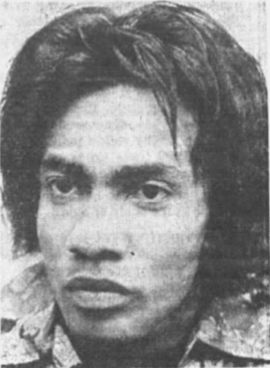 Chicago Tribune, John Bartley On the night of April 24, 1971, 15-year-old Mitchell Thompson was hosting a party at his mother’s house on the south side of Chicago. His older brother, Ronald Thompson, was out for the evening. The boys’ mother was at a wedding and had forbade Mitchell from having friends over. For this reason, Mitchell was peering out the window each time a car passed, checking to make sure that his mother was not arriving home earlier than expected.
Just after 12:30 a.m., car lights caused Mitchell to look outside, and he saw Ronald walking along the street at the nearby intersection as an unfamiliar car drove past. Since the car was not his mother’s, Mitchell closed the curtain, only to reopen it when he heard car tires screech a moment later. According to Mitchell’s later testimony, he then saw two teenagers exit the unfamiliar car. Mitchell recognized the two teens as Larry Littleton and a person he knew only by the name, “Looney.” Littleton and Looney spoke to Ronald for a few seconds, then Ronald started to walk away. Mitchell then said he heard Looney yell “Gangster thing” and saw him pull out a shotgun out from under his coat.
Mitchell said he then stepped away from the window and ran toward the door to warn his brother, but he heard a gunshot before he reached the doorway. Mitchell said that as he opened the door, Larry Littleton, Looney, and a person he knew only as “Lumberjack” ran past him, with Looney carrying the shotgun. Mitchell later testified that Looney pointed the shotgun at him as he ran past, and Mitchell dropped to the ground. Ronald Thompson was killed by the gunshot.
Michell later identified a mugshot of “Looney.” He was 18-year-old James Dixon, and he was charged with murder.
Dixon was tried in a bench trial in the Circuit Court of Cook County before Judge Daniel Ryan. The prosecution’s case relied on the testimony of Mitchell Thompson, who was the state’s only witness to the shooting. Dixon testified that he was at a wedding reception from 10:45 p.m. until 3 a.m. on the night of the shooting and provided five witnesses who testified to his presence at the reception. In rebuttal, the prosecution offered testimony that the drive from the wedding reception to Thompson’s neighborhood took less than five minutes. Dixon was convicted of Thompson’s murder and sentenced to 25 to 60 years in prison. The court entered a finding of not guilty for his codefendant, Larry Littleton.
Three weeks after his conviction, Dixon filed a motion for a new trial on the basis of newly discovered evidence. The evidence at issue was a pretrial statement made to police by Wendell Robinson, a teen who had been in attendance at Mitchell Thompson’s party but had left before the shooting. Robinson had been interviewed by police on April 25, 1971, the day of the shooting. Robinson told police that he was still nearby at the time of the shooting, and he saw a group of boys travel on foot to the corner where the shooting took place. He said he heard the shot and saw the boys flee. Robinson said he did not see the car described by Mitchell nor hear tires screech, and he did not hear anyone yell “Gangster thing.”
Neither the content of this police interview with Robinson nor the fact that it had taken place were disclosed to the defense prior to Dixon’s trial. Additionally, Robinson’s name had not been provided to the defense in response to a pretrial request for the names and addresses of all persons who had knowledge of the crime and all persons whose testimony would be favorable to the defense.
Attorney Jeffrey Haas, assisted by law students Peter Schmiedel and Kathy Auchincloss, represented Dixon in his appeal. Finding that Robinson’s statement was material and had been suppressed by the prosecution, the Appellate Court of Illinois reversed Dixon’s conviction on April 24, 1974 and remanded the case for a new trial. Newspaper articles following the later developments of the case stated that Mitchell Thompson recanted his statement, and the charges against Dixon were soon dismissed.
The year after his release,
James Dixon
was charged with shooting a Chicago police officer and pled guilty. Shortly after his plea was entered, prosecutors learned that the officer had actually shot himself by accident with an illegal weapon. Dixon’s conviction was vacated and the charge against him was dismissed in August 1976. In a settlement the next year, the city agreed to pay Dixon $50,000 for this false imprisonment.
- Meghan Barrett Cousino |